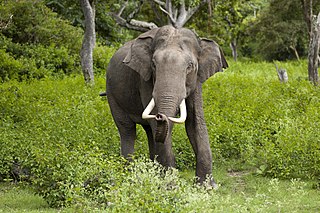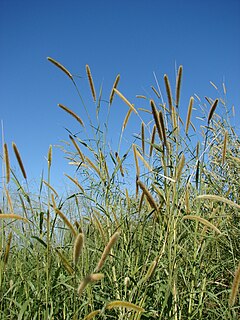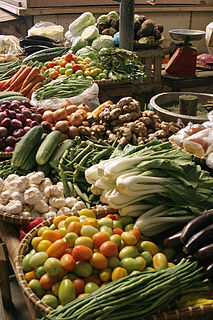Related Research Articles

Niger is a landlocked nation in West Africa located along the border between the Sahara and Sub-Saharan regions. Its geographic coordinates are longitude 16°N and latitude 8°E. Its area is 1.267 million square kilometers, of which 1 266 700 km² is land and 300 km² water, making Niger slightly less than twice the size of France.

The chili pepper, from Nahuatl chīlli, is the berry-fruit of plants from the genus Capsicum which are members of the nightshade family, Solanaceae. Chili peppers are widely used in many cuisines as a spice to add pungent 'heat' to dishes. Capsaicin and related compounds known as capsaicinoids are the substances giving chili peppers their intensity when ingested or applied topically.
The International Treaty on Plant Genetic Resources for Food and Agriculture, is a comprehensive international agreement in harmony with the Convention on Biological Diversity, which aims at guaranteeing food security through the conservation, exchange and sustainable use of the world's plant genetic resources for food and agriculture (PGRFA), the fair and equitable benefit sharing arising from its use, as well as the recognition of farmers' rights. It was signed in 2001 in Madrid, and entered into force on 29 June 2004.

The Asian elephant, also known as the Asiatic elephant, is the only living species of the genus Elephas and is distributed throughout the Indian subcontinent and Southeast Asia, from India in the west, Nepal in the north, Sumatra in the south, and to Borneo in the east. Three subspecies are recognised—E. m. maximus from Sri Lanka, E. m. indicus from mainland Asia and E. m. sumatranus from the island of Sumatra.

Kakum National Park, located in the coastal environs of the Central Region of Ghana, covers an area of 375 square kilometres (145 sq mi). Established in 1931 as a reserve, it was gazetted as a national park only in 1992 after an initial survey of avifauna was conducted. The area is covered with tropical forest. The uniqueness of this park lies in the fact that it was established at the initiative of the local people and not by the State Department of wildlife who are responsible for wildlife preservation in Ghana. It is one of only 3 locations in Africa with a canopy walkway, which is 350 metres (1,150 ft) long and connects seven tree tops which provides access to the forest.

Trophy hunting is hunting of wild animals as trophies, with the whole or parts of the hunted animal kept and usually displayed to represent the success of the hunter. The preferred target animal, known as the game, is typically a large or impressively ornamented male, such as one having large horns or antlers. Usually, only some parts of the animal are kept as trophies, although preserving the entire animal via taxidermy is also practised.

Cenchrus purpureus, synonym Pennisetum purpureum, also known as Napier grass, elephant grass or Uganda grass, is a species of perennial tropical grass native to the African grasslands. It has low water and nutrient requirements, and therefore can make use of otherwise uncultivated lands. Historically, this wild species has been used primarily for grazing, recently, however, it has been used as part of a push–pull agricultural pest management strategy. Napier grasses improve soil fertility, and protect arid land from soil erosion. It is also utilized for firebreaks, windbreaks, in paper pulp production and most recently to produce bio-oil, biogas and charcoal.

Liwonde National Park, also known as Liwonde Wildlife Reserve, is a national park in southern Malawi, near the Mozambique border. The park was established in 1973, and has been managed by the nonprofit conservation organization African Parks since August 2015. African Parks built an electric fence around the perimeter of the park to help mitigate human-wildlife conflict. In early 2018, the adjacent Mangochi Forest Reserve was also brought under African Parks' management, almost doubling the size of the protected area.

The Crop Trust, officially known as the Global Crop Diversity Trust, is an international nonprofit organization which works to preserve crop diversity in order to protect global food security. It was established through a partnership between the United Nations Food and Agriculture Organization and CGIAR acting through Bioversity International.

Vegetables are parts of plants that are consumed by humans or other animals as food. The original meaning is still commonly used and is applied to plants collectively to refer to all edible plant matter, including the flowers, fruits, stems, leaves, roots, and seeds. An alternate definition of the term is applied somewhat arbitrarily, often by culinary and cultural tradition. It may exclude foods derived from some plants that are fruits, flowers, nuts, and cereal grains, but include savoury fruits such as tomatoes and courgettes, flowers such as broccoli, and seeds such as pulses.

Human–wildlife conflict(HWC) refers to the negative interactions between human and wild animals, with undesirable consequences for both people and their resources and wildlife and their habitats. HWC, caused by competition for shared natural resources between human and wildlife, influences human food security and the well-being of both human and animals. In many regions these conflicts have intensified over recent decades as a result of human population growth and the transformation of land use.

The Chad Basin National Park is a national park in northeastern Nigeria, in the Chad Basin, with a total area of about 2,258 km2. The park is fragmented, with three sectors. The Chingurmi-Duguma sector is in Borno State, in a Sudanian Savanna ecological zone. The Bade-Nguru Wetlands and Bulatura sectors are in Yobe State in the Sahel ecological zone.

The International Elephant Foundation (IEF) is a non-profit 501(c)(3) corporation. Formed by individuals and institutions, IEF is dedicated to the conservation of African and Asian elephants worldwide.
The African Wildlife Foundation (AWF) is the leading international conservation organization focused exclusively on Africa's wildlife and wild lands.

Deforestation in the Democratic Republic of the Congo (DRC) is a significant transnational issue. In the DRC, forests are cleared for agricultural purposes by utilizing slash and burn techniques.
Millennium Elephant Foundation (MEF) is an organization and charity set up to rescue and care for captive Asian elephants in Sri Lanka. The foundation is situated on a 15-acre estate by the name of Samaragiri, which is located 10 km (6.2 mi) northwest of Kegalle, within the Sabaragamuwa Province of Sri Lanka. As of 2019 there are 10 elephants that either permanently or temporarily reside at the sanctuary. These elephants are taken care of by 13 local mahouts and a number of foreign volunteers.

The Sheldrick Wildlife Trust operates an orphan elephant rescue and wildlife rehabilitation program in Kenya. It was founded in 1977 by Dame Daphne Sheldrick to honor her late husband, David Sheldrick. Since 2001, it has been run by their daughter, Angela Sheldrick.
Care for the Wild International is an animal charity, a non-governmental organization established in 1984 and based in the United Kingdom. It supports wildlife projects and it campaigns on animal rights issues in Britain and around the world.
Wildlife SOS (WSOS) is a conservation non-profit in India, established in 1995 with the primary objective of rescuing and rehabilitating wildlife in distress, and preserving India’s natural heritage. It is currently one of the largest Wildlife Organisations in South Asia.
Big Life Foundation is non-profit conservation organization focused on preserving the wildlife and habitats of the Amboseli-Tsavo-Kilimanjaro ecosystem of East Africa through community-based and collaborative strategies.
References
- ↑ "Background Information-The Elephant Pepper Development Trust" (PDF). Development Marketplace Project Completion Summary. World Bank . Retrieved 2008-03-15.
- ↑ "Elephant Pepper Development Trust". Wildlife Conservation Society. Archived from the original on 2007-12-13. Retrieved 2008-03-15.